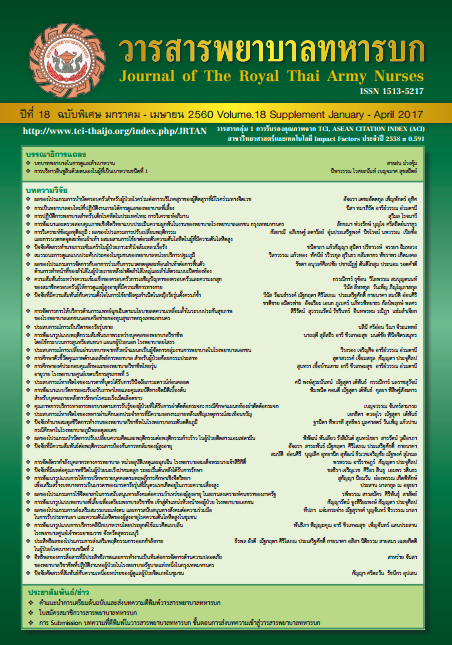การศึกษาตัวชี้วัดคุณภาพด้านผลลัพธ์การพยาบาล สำหรับผู้ป่วยศัลยกรรมประสาท
Keywords:
ตัวชี้วัดคุณภาพด้านผลลัพธ์การพยาบาล, ผู้ป่วยศัลยกรรมประสาท, Quality indicators, Neurosurgery patients, Nursing outcomesAbstract
การวิจัยครั้งนี้มีวัตถุประสงค์เพื่อศึกษาตัวชี้วัดคุณภาพด้านผลลัพธ์การพยาบาลผู้ป่วยศัลยกรรมประสาท โดยใช้เทคนิคการวิจัยแบบเดลฟาย กลุ่มตัวอย่างที่ศึกษาเป็นผู้เชี่ยวชาญที่เกี่ยวข้องกับการดูแลผู้ป่วยศัลยกรรมประสาท จำนวน 21 คน วิธีดำเนินการวิจัยประกอบด้วย 3 ขั้นตอน คือ ขั้นตอนที่ 1 สัมภาษณ์เกี่ยวกับตัวชี้วัดคุณภาพด้านผลลัพธ์การพยาบาลผู้ป่วยศัลยกรรมประสาทขั้นตอนที่ 2 นำข้อมูลที่ได้มาวิเคราะห์เนื้อหาแล้วนำมาสร้างแบบสอบถามให้ผู้เชี่ยวชาญแสดงความคิดเห็นเกี่ยวกับระดับความสำคัญของข้อคำถามในแต่ละข้อ และขั้นตอน ที่ 3 นำข้อมูลที่ได้มาคำนวณค่ามัธยฐาน ค่าพิสัยระหว่างควอไทล์แล้วนำแบบสอบถามไปให้ผู้เชี่ยวชาญยืนยันคำตอบ นำข้อมูลที่ได้มาคำนวณค่ามัธยฐานและค่าพิสัยระหว่างควอไทล์เพื่อสรุปผลการวิจัยผลการวิจัยพบว่าตัวชี้วัดคุณภาพด้านผลลัพธ์การพยาบาลผู้ป่วยศัลยกรรมประสาท ผู้เชี่ยวชาญมีความคิดเห็นสอดคล้องกัน 10 ด้าน ประกอบด้วย 1) ด้านความปลอดภัยจากความดันในกะโหลกศีรษะสูง (IICP) 2) ด้านความปลอดภัยจากเนื้อเยื่อสมองพร่องออกซิเจน 3) ด้านความปลอดภัยจากการใช้ยาลดสมองบวม (Mannitol) ทางหลอดเลือดดำ 4) ด้านความสามารถในการปฏิบัติตัวหลังผ่าตัดในผู้ป่วยที่มีระดับความรู้สึกตัวปกติ (Glasgow Coma Scale=15) 5) ด้านความปลอดภัยจากภาวะแทรกซ้อนที่ป้องกันได้จากการผ่าตัดสมอง ไขสันหลังและการทำหัตถการต่างๆ 6) ด้านความปลอดภัยจากการติดเชื้อของระบบประสาทส่วนกลางที่เกิดจากแผลผ่าตัดบริเวณศีรษะและไขสันหลัง 7) ด้านความปลอดภัยจากภาวะแทรกซ้อนที่เกิดจากระดับความรู้สึกตัวเปลี่ยนแปลง การเคลื่อนไหวของร่างกายบกพร่อง 8) ด้านความทุเลาจากอาการปวดแผลผ่าตัดและปวดจากพยาธิสภาพของโรค 9) ด้านการตอบสนองทางด้านร่างกาย จิตใจ สังคม และจิตวิญญาณ และ 10) ด้านความสามารถในการฟื้นฟูสมรรถภาพร่างกายของผู้ป่วยและครอบครัว/ผู้ดูแล
A Study Of Nursing Outcomes Quality Indicators For Patients With Neurosurgery
The purpose of this research was to study of nursing outcomes quality indicators for patients with neurosurgery by using Delphi technique. The subjects were twenty one experts in neurosurgery nursing care. The questionnaires were developed by researcher in 3 stages. The first, by using semi-open ended from of questionnaires, the expert were asked to identify of nursing outcomes quality indicators for patient with neu-rosurgery. The second, data from the first were analyzed and quality indicators were developed by using rating scale questionnaires. The third, data were analyzed by using median and interquartile range which was sent to previous experts for confirm the previous ranked items. Data were analyzed again by using median and interquartile range to summarize the research. The research result showed the nursing outcomes quality indicators for patients with neurosurgery were agreed by experts in 10 domains as follows; 1) safety from Increase Intracranial Pressure (IICP), 2) safety from brain hypoxia, 3) safety from utilizing medication to reduce brain edema (mannitol injection), 4) the ability to perform post surgery for good conscious patient (Glasgow Coma Scale=15) before and after surgery, 5) safety from complications of brain and spine surgery and other operations, 6) safety from central nervous system infection caused by brain and spinal surgery, 7)safety from the complications caused by changing in level of consciousness and immobility, 8) relief pain from the surgical wound and pathology of the diseases, 9) the responses of physical, mental, social and spiritual, and 10) the ability for rehabilitation of patient and family/caregiver.
Downloads
How to Cite
Issue
Section
License
บทความหรือข้อคิดเห็นใดใดที่ปรากฏในวารสารพยาบาลทหารบกเป็นวรรณกรรมของผู้เขียน ซึ่งบรรณาธิการหรือสมาคมพยาบาลทหารบก ไม่จำเป็นต้องเห็นด้วย
บทความที่ได้รับการตีพิมพ์เป็นลิขสิทธิ์ของวารสารพยาบาลทหารบก
The ideas and opinions expressed in the Journal of The Royal Thai Army Nurses are those of the authors and not necessarily those
of the editor or Royal Thai Army Nurses Association.





